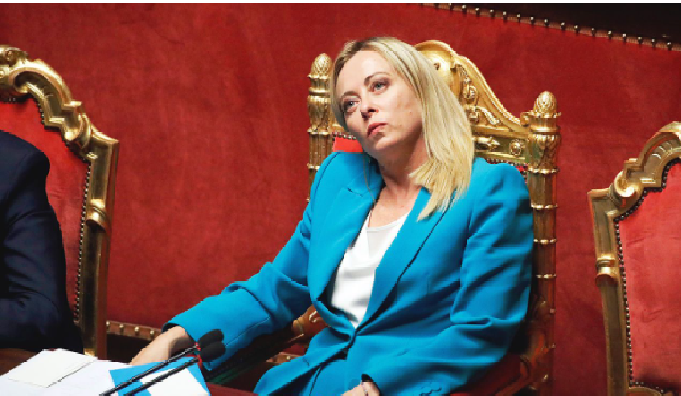In a move reflecting both the growing complexities of European migration policy and the political pressures faced by Italy`s right-wing government, a new decree has been approved to repurpose Albanian migration centers as repatriation hubs. Under this revised framework, two centers in Albania, originally designated for processing asylum claims of non-vulnerable migrants intercepted in international waters, will now also serve as holding facilities for individuals whose asylum requests in Italy have been rejected and who have subsequently received deportation orders.
A Controversial Policy Shift
The decision marks a significant escalation in Italy’s handling of irregular migration and aligns with a broader European Union push to externalize border controls. The decree effectively expands Italy’s cooperation with Albania beyond its initial intent, reinforcing the strategy of outsourcing migration management to non-EU states. However, this move is not without controversy.
Since their establishment in October, the Albanian centers have been largely dormant, hindered by legal challenges and staunch opposition from human rights organizations. Critics argue that detaining migrants in a third country – outside the jurisdiction of the European Union – raises serious legal and ethical concerns, potentially violating international conventions on refugee rights and due process.
Moreover, the €800 million investment over five years, initially championed by Prime Minister Giorgia Meloni’s government as a solution to Italy’s migration challenges, has yet to yield tangible results. Legal complications have thwarted the project’s initial objectives, with Italian magistrates blocking the detention of migrants in Albania and ordering their return to Italy just hours after their transfer. These legal setbacks have forced the government to recalibrate its approach, resulting in the latest decree.
Political and Strategic Implications
Interior Minister Matteo Piantedosi emphasized that while the decree does not alter the core agreement with Albania, it does expand the centers’ functionality. By
integrating repatriation operations into the Albanian facilities, Italy seeks to reinforce its migration control measures while salvaging an expensive and politically sensitive initiative. Piantedosi framed the decision as a pragmatic step to prevent the centers from becoming obsolete, stating that it ensures the facilities retain their intended role within the broader migration strategy.
This shift also aligns with recent EU-level discussions on migration management. In March, the European Commission proposed the creation of new “return hubs“; in third countries to facilitate the deportation of rejected asylum seekers, citing the inefficiency of current repatriation efforts – only 20% of individuals with deportation orders are successfully removed from EU territory. By adapting the Albanian centers for deportation purposes, Italy is positioning itself at the forefront of this evolving European migration strategy.
Legal and Humanitarian Concerns
Despite the government’s efforts to reframe the policy as a necessary response to
logistical challenges, legal uncertainties persist. A pending ruling from the European Court of Justice, expected later this year, could determine whether the Albanian facilities can function as originally envisioned. Should the court rule against the initiative, the entire framework could be called into question, dealing a further blow to Meloni’s administration.
Beyond the legal realm, human rights organizations warn that the expansion of these centers could lead to an erosion of migrant protections. The risk of inadequate oversight in a non-EU country, combined with Albania’s limited infrastructure to handle large-scale repatriation, raises significant concerns about transparency, legal recourse, and humanitarian conditions.
Stricter Citizenship Rules: A Parallel Tightening of Immigration Policy
In a parallel move indicative of the government’s broader stance on migration, Italy has also tightened its citizenship laws. Under a separate decree, automatic Italian citizenship will now only be granted for two generations to descendants of Italian emigrants, requiring at least one parent or grandparent to have been born in Italy.
Foreign Minister Antonio Tajani defended the changes as a necessary measure to curb the “commercialization” of Italian passports and prevent abuses of citizenship laws. This policy shift comes against the backdrop of a 40% increase in the number of Italian citizens residing abroad over the past decade, with over 60,000 pending citizenship applications. By narrowing eligibility, the government aims to exert greater control over nationality claims while reinforcing a nationalist narrative that has been central to its political agenda.
A Balancing Act Between Control and Compliance
The expansion of Albania’s migration centers into repatriation hubs underscores the Italian government’s broader effort to exert stricter control over migration flows while navigating legal, diplomatic, and humanitarian challenges. However, the initiative remains a precarious balancing act – while it may help Meloni’s administration demonstrate a tough stance on migration, its ultimate viability depends on legal rulings, international scrutiny, and the practical challenges of enforcing deportation policies. At the European level, Italy’s strategy reflects a wider trend toward externalizing migration enforcement, but whether such measures can withstand legal and ethical scrutiny remains an open question. As the government continues to push forward with its migration agenda, the broader implications for human rights, international cooperation, and the long-term sustainability of these policies will be closely watched.
Written by our correspondent A.T.



